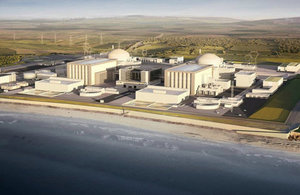Government confirms Hinkley Point C project following new agreement in principle with EDF
Ministers impose significant new safeguards for future foreign investment in critical infrastructure.

Hinkley Point C
Following a comprehensive review of the Hinkley Point C project, and a revised agreement with EDF, the Government has decided to proceed with the first new nuclear power station for a generation. However, ministers will impose a new legal framework for future foreign investment in Britain’s critical infrastructure, which will include nuclear energy and apply after Hinkley.
The agreement in principle with EDF means that:
The Government will be able to prevent the sale of EDF’s controlling stake prior to the completion of construction, without the prior notification and agreement of ministers. This agreement will be confirmed in an exchange of letters between the Government and EDF. Existing legal powers, and the new legal framework, will mean that the Government is able to intervene in the sale of EDF’s stake once Hinkley is operational.
The new legal framework for future foreign investment in British critical infrastructure will mean that:
After Hinkley, the British Government will take a special share in all future nuclear new build projects. This will ensure that significant stakes cannot be sold without the Government’s knowledge or consent.
The Office for Nuclear Regulation will be directed to require notice from developers or operators of nuclear sites of any change of ownership or part-ownership. This will allow the Government to advise or direct the ONR to take action to protect national security as a result of a change in ownership.
There will be reforms to the Government’s approach to the ownership and control of critical infrastructure to ensure that the full implications of foreign ownership are scrutinised for the purposes of national security. This will include a review of the public interest regime in the Enterprise Act 2002 and the introduction of a cross-cutting national security requirement for continuing Government approval of the ownership and control of critical infrastructure.
These changes will bring Britain’s policy framework for the ownership and control of critical infrastructure into line with other major economies. This will allow the UK Government to introduce a consistent approach to considering the national security implications of all significant investments in critical infrastructure, including nuclear energy, in the future. The changes mean that, while the UK will remain one of the most open economies in the world, the public can be confident that foreign direct investment works in the country’s best interests.
Greg Clark, Secretary of State for Business, Energy and Industrial Strategy, said:
Having thoroughly reviewed the proposal for Hinkley Point C, we will introduce a series of measures to enhance security and will ensure Hinkley cannot change hands without the Government’s agreement. Consequently, we have decided to proceed with the first new nuclear power station for a generation.
Britain needs to upgrade its supplies of energy, and we have always been clear that nuclear is an important part of ensuring our future low-carbon energy security.
The collaboration between France and the United Kingdom underlines the continued strength of the bilateral relationship and the ongoing industrial and energy co-operation.
The Government is committed to ensuring the country has a secure low carbon energy supply. Hinkley Point C will be a critical part of that, and will inaugurate a new era of UK nuclear power - building on Britain’s strong nuclear legacy. Currently, the UK has eight nuclear power stations which generate around 20% of power in the UK. Almost all of these existing power stations are due to close by 2030. This underlines why the Government needs to take decisions now on how we will ensure we have sufficient and diverse supply fit for future generations.
Hinkley Point C will provide seven per cent of Britain’s electricity needs for sixty years. UK-based businesses will benefit from more than 60% of the £18 billion value of the project, and 26,000 jobs and apprenticeships will be created.
Notes to Editors
The Secretary of State is minded to direct the Low Carbon Contracts Company to offer a Contract for Difference to EDF. The Contract for Difference would provide a set price of £92.50 per megawatt hour of electricity provided by Hinkley Point C for 35 years once it begins generating. The difference between the strike price and the wholesale price is paid for through consumer bills, in the same way as other clean technologies such as offshore wind.